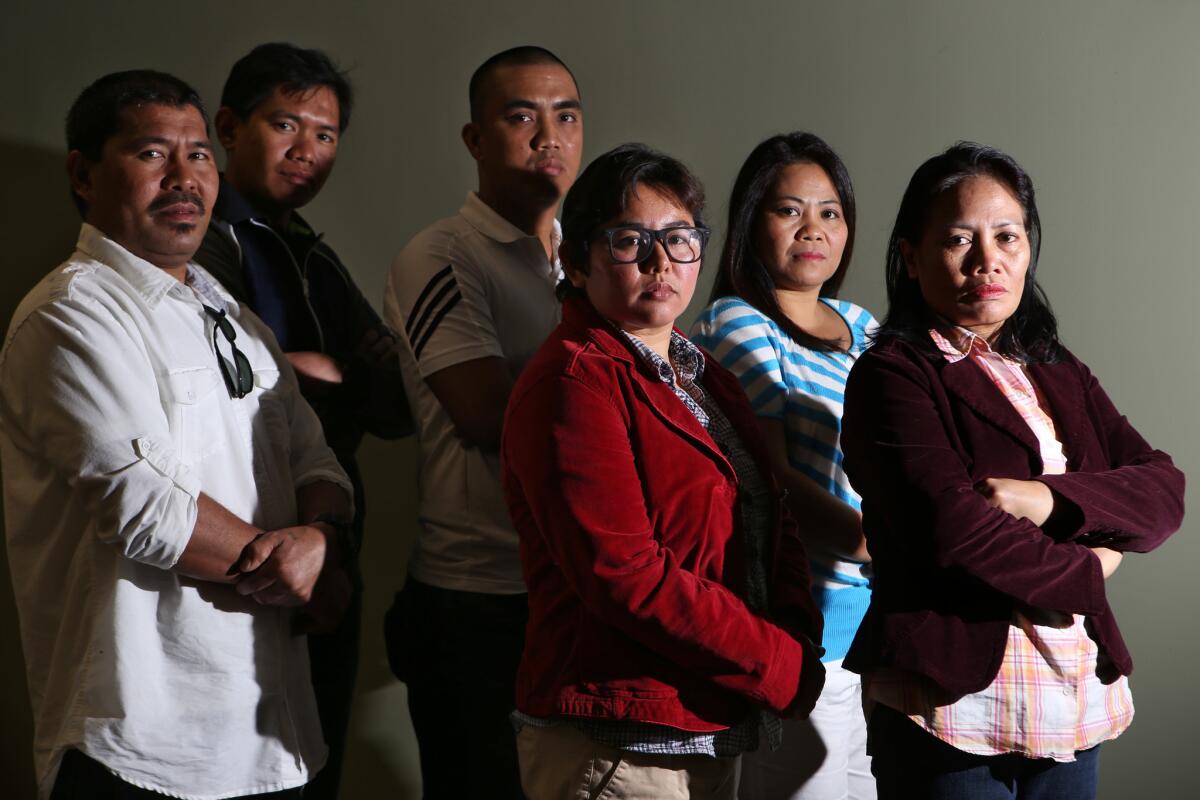Beverly Hills bakery workers say they were paid as little as $2 an hour

- Share via
The owners of two French bakeries in Southern California exploited employees who came to the United States from the Philippines on guest worker visas for what they thought would be well-paying jobs, the immigrants allege in a lawsuit filed Wednesday.
Eleven current and former employees of the L’Amande French Bakery in Beverly Hills and Torrance say the owners promised their pay would be as much as five times what they were earning in the Philippines.
But when the first workers arrived in 2012 under a little-known visa program for foreign investors and their employees, that was not the case, they allege.
The workers said that for months they were paid as little as $2 an hour to do cleaning and landscaping work at the Rolling Hills Estates home of Ana Moitinho de Almeida and her husband, Goncalo. The workers say they slept on the floor of the laundry room.
They say they were also forced to work up to 17-hour days at the bakeries for less than minimum wage and no overtime pay. One worker was paid only $100 for a month’s work, according to the lawsuit.
The Almeidas are accused of multiple labor violations, as well as human trafficking and retaliation, after several workers who cooperated with a state investigation into wage theft claims were fired.
The Almeidas, who did not respond to requests for comment Thursday morning, were ordered last year by the California Labor Commissioner’s office to pay $245,000 in overtime wages to bakery workers, said Julia Bernstein, a spokeswoman for the California Department of Industrial Relations. The couple appealed, and a hearing is set for May.
------------
FOR THE RECORD
March 19, 4:30 p.m.: An earlier version of this post said the California Labor Commissioner’s office had ordered the bakery owners to pay more than $250,000 in overtime wages. The amount was $245,000.
------------
Lawyers for the workers blamed the Almeidas as well as the temporary worker visa program they say the couple easily exploited.
Most temporary foreign workers are not legally allowed to change jobs, even if they are underpaid. Those who speak out about labor violations may face retaliation or be sent home.
“Workers are trapped,” said Nicole Gon Ochi, an attorney with the Los Angeles chapter of Asian Americans Advancing Justice, which filed the lawsuit with the law firm Latham & Watkins. “They’re stuck between a rock and a hard place because their status is tied to their employer.”
The 11 Filipino workers came to the U.S. on E-2 visas, which gives immigrants with specialized skills authorization to work for a foreign national who has invested a substantial amount of money in a U.S.-based business.
Federal statistics show the number of E-2 visas issued by the State Department has risen sharply in recent years, from 24,033 in fiscal year 2009 to 35,272 four years later. The visas may be renewed indefinitely.
But once the workers arrive on U.S. soil, there is little oversight to make sure they are doing specialized work and are being paid what they were promised.
According to the lawsuit, the workers were brought to the U.S. in several groups between 2009 to 2014.
In visa applications at the U.S. Embassy in the Philippines, the Almeidas told State Department officials their workers would be paid at least $2,000 a month and would be employed as managers or specialists at the bakery, according to the complaint.
In reality, some ended up washing dishes or doing construction projects on an apartment complex the couple owned, the lawsuit says.
“This is not what I signed up for,” said one former worker, Louise Luis, 40, who was told she would be a bakery manager. “Ana promised me a job that meant enough to save for a good future for me and my family. All I dreamed of was the chance to save and work.”
She said the Almeidas dissuaded the workers from socializing and did not allow them to leave the property without permission during the months they lived at the couple’s home.
When employees complained about the conditions to the Almeidas, the couple said each worker owed them $11,000 for the cost of their visas and airfare, according to the lawsuit. They told employees they would have to work for at least three years to repay the debt.
The Almeidas also threatened to have the workers deported if they cooperated with the state investigation, according to the complaint.
Attorneys for the workers who filed the lawsuit say they are pursuing T visas for their clients, which allow victims of human trafficking to live in the U.S.
If the workers aren’t granted protected status, they will have to go home.
Twitter: @katelinthicum
More to Read
Sign up for Essential California
The most important California stories and recommendations in your inbox every morning.
You may occasionally receive promotional content from the Los Angeles Times.














